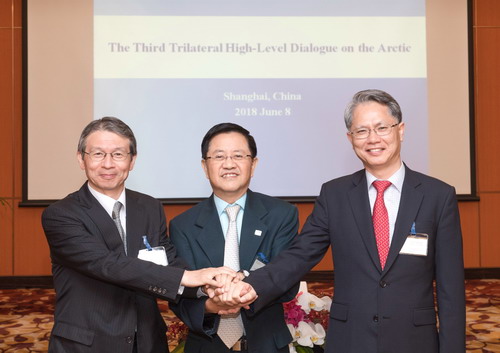For Asian countries, Arctic co-operation reflects regional realities
As China, Japan and South Korea get more involved in Arctic, their annual meeting to discuss the region shows signs of their increasing confidence about their role.

Physically, the Arctic is far from northeast Asia. Judging from outcome of the third annual meeting of representatives from China, Japan and South Korea to discuss the region, held on June 8, it is over the horizon mentally, too, though perhaps only for the time being.
“The trilateral meeting,” says Aki Tonami, a Japanese academic, “is more related to ‘talks about talks’, confidence building, or in this case, assessing one another’s activities.”
All three countries were admitted, together with India and Singapore, as the Arctic Council’s first Asian observers in 2013. Friday’s meeting, held in Shanghai, was the third time their representatives have gathered on their own to discuss their positions toward the region.
According to a statement, the meeting “addressed the Arctic’s common challenges … from the perspective of East Asian countries and reiterated their intention to make contributions to promoting peace, stability and sustainable development in the Arctic.”
[China, Japan and South Korea hold their own Arctic dialogue]
While that sounds roughly similar to what they said came up during the 2017 meeting, Tonami notes that, this year, they emphasized their own Arctic activities. And although they affirmed the “positive role” of the Arctic Council, they did not do so until they had run down their own priorities and accomplishments.
“This suggests the engagement of the three countries, particularly China, in the Arctic is becoming much more ‘real’ than just going to the [working group] meetings of the Arctic Council,” Tonami said. “They are probably becoming more confident about being (the crucial) actors of the Arctic outside of the [Arctic Council].”
The first two meetings, according to Marc Lanteigne, a Canadian academic and editor of the blog Over the Circle, established that the three countries need to work together to develop Arctic research and scientific policies, while promoting the region as a zone of peace and sustainable development.
“Thus far,” he wrote in a commentary, “these meetings have produced little in terms of concrete regional initiatives beyond pledges for future co-operation, yet these summits have been illustrative of the amount of common ground the three states have relating to Arctic engagement.”
[An observer is as an observer does]
Another reason the three countries are keen to keep talking, he said, was that it helps ensure they do not get left out of economic developments taking place in the Arctic.
The outcome of last week’s meeting, according to Tonami, confirmed that the meetings are useful for emphasizng the countries’ common Arctic interests. However, she noted that a careful read of last year’s and this year’s final statements shows their differing approaches to foreign policy.
The 2017 statement, penned by Japan, included the phrase “rule-based maritime order”, which she says is shorthand for “the rule of law”, and reflects Japan’s position towards territorial conflicts in the Asian waters.
“This has been changed to ‘cooperation in a rule-based manner’ in 2018,” she said, “which sounds similar but not quite the same, but fits China’s position on overall maritime order.”
Such linguistic twists would seem to indicate that northeast Asia’s common challenges may soon take on an Arctic perspective.